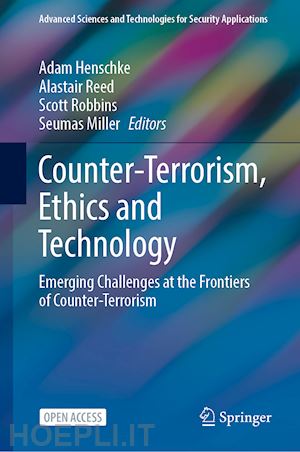

Questo prodotto usufruisce delle SPEDIZIONI GRATIS
selezionando l'opzione Corriere Veloce in fase di ordine.
Pagabile anche con Carta della cultura giovani e del merito, 18App Bonus Cultura e Carta del Docente
This open access book brings together a range of contributions that seek to explore the ethical issues arising from the overlap between counter-terrorism, ethics, and technologies. Terrorism and our responses pose some of the most significant ethical challenges to states and people. At the same time, we are becoming increasingly aware of the ethical implications of new and emerging technologies. Whether it is the use of remote weapons like drones as part of counter-terrorism strategies, the application of surveillance technologies to monitor and respond to terrorist activities, or counterintelligence agencies use of machine learning to detect suspicious behavior and hacking computers to gain access to encrypted data, technologies play a significant role in modern counter-terrorism. However, each of these technologies carries with them a range of ethical issues and challenges. How we use these technologies and the policies that govern them have broader impact beyond just the identification and response to terrorist activities. As we are seeing with China, the need to respond to domestic terrorism is one of the justifications for their rollout of the “social credit system.” Counter-terrorism technologies can easily succumb to mission creep, where a technology’s exceptional application becomes normalized and rolled out to society more generally. This collection is not just timely but an important contribution to understand the ethics of counter-terrorism and technology and has far wider implications for societies and nations around the world.
Dr Adam Henschke is an Assistant Professor with the Department of Philosophy, in the Faculty of Behavioural, Management, and Social Sciences at the University of Twente, in the Netherlands. Previously he was a Senior Lecturer with the Crawford School of Public Policy, at the Australian National University, and a Senior Researcher at the Delft University of Technology (TU Delft) in the Netherlands, working on the European Research Council advanced grant project Global Terrorism and Collective Moral Responsibility, of which this book is a part. Adam works on areas of ethics, technology, and security policy. His research interests include ethics of surveillance technologies, human enhancement technologies, propaganda, intelligence, and the ethics of counter-terrorism. He is currently researching the ethics of the internet of things, and other issues arising with cyber-physical systems, and evolving ethical challenges with information warfare. His most recent edited books includethe Palgrave Handbook of National Security (co-edited with Michael Clarke, Matthew Sussex, and Tim Legrand) and Counter-Terrorism: The Ethical Issues (co-edited with Seumas Miller and Jonas Feltes).
Dr Alastair Reed is the Executive Director of the RESOLVE Network, housed at the United States Institute of Peace, and an associate professor at the Cyber Threats Research Centre (CYTREC) at Swansea University in the UK. Previously he was a Senior Researcher at the Delft University of Technology (TU Delft) in the Netherlands, working on the ERC advanced grant project Global Terrorism and Collective Moral Responsibility, of which this book is a part. A researcher in the fields of Counterterrorism and Countering Violent Extremism, he has provided policy advice and training to a wide range of government and international organisations. Alastair’s research interests cover foreign fighters, radicalization, terrorist and insurgent strategy, propaganda, and strategic communications. His current area of focus is on understanding and responding to terrorist and extremist propaganda, and addressing the challenges of countering terrorist and extremist propaganda online. His work has been published in Defence Strategic Communications Journal, RUSI Journal, Studies in Conflict and Terrorism and Internet Policy Review.
Scott Robbins is a Ph.D. researcher at the Technical University of Delft, focusing on the ethics of using artificial intelligence in the context of counter-terrorism. He also researches the ethics surrounding bulk data collection for policing and counter-terrorism. He is a part of the ERC advanced grant research project entitled Global Terrorism and Collective Moral Responsibility. He has published peer-reviewed articles on the ethics of artificial intelligence and ethics for the design of new technologies. He is a founding organizingcommittee member of the Foundation for Responsible Robotics and a member of the 4TU Centre for Ethics and Technology. He holds a Bachelor’s of Science in Computer Science (cum laude) and a Master’s of Science in ethics and technology (cum laude).
Professor Seumas Miller holds academics appointments at Charles Sturt University, Delft University of Technology and the University of Oxford. He is the author of over 250 academic articles and 22 books, including the Moral Foundations of Social Institutions (Cambridge University Press, 2010), Shooting to Kill: The Ethics of Police and Military Use of Lethal Force (Oxford University Press, 2016), Institutional Corruption (Cambridge University Press, 2017), Dual Use Science and Technology, Ethics and Weapons of Mass Destruction (Springer, 2018), (with Marcus Smith) Biometric Identification, Law and Ethics (Springer, 2021),and (with Terry Bossomaier) Ethics and Cybersecurity (Oxford University Press, 2022).











Il sito utilizza cookie ed altri strumenti di tracciamento che raccolgono informazioni dal dispositivo dell’utente. Oltre ai cookie tecnici ed analitici aggregati, strettamente necessari per il funzionamento di questo sito web, previo consenso dell’utente possono essere installati cookie di profilazione e marketing e cookie dei social media. Cliccando su “Accetto tutti i cookie” saranno attivate tutte le categorie di cookie. Per accettare solo deterninate categorie di cookie, cliccare invece su “Impostazioni cookie”. Chiudendo il banner o continuando a navigare saranno installati solo cookie tecnici. Per maggiori dettagli, consultare la Cookie Policy.